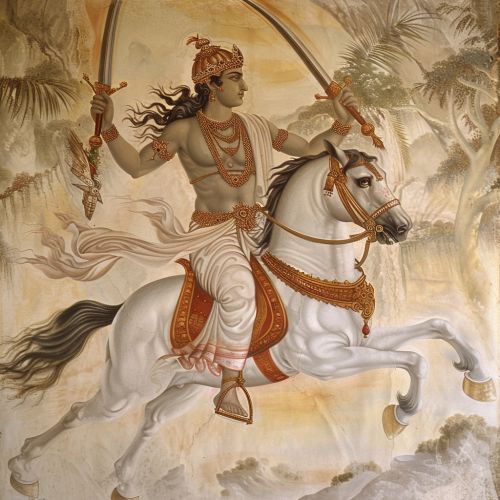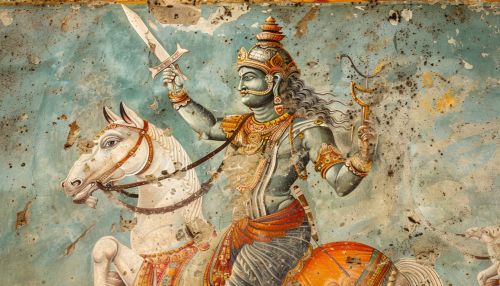Kalki
Introduction
Kalki, also known as Kalkin or Karki, is a figure in Hindu eschatology and is considered to be the tenth and final avatar of the Hindu God Vishnu. The name Kalki is often translated as "Eternity" or "White Horse". This avatar is yet to appear and is expected to arrive at the end of the current epoch, the Kali Yuga, to restore righteousness and order in the world.


Origin and Etymology
The term 'Kalki' is derived from the Sanskrit word 'kalka' which means filth, thus implying the 'destroyer of filth'. It is also associated with the color white, symbolizing purity and divinity. The concept of Kalki is found in the Puranas, ancient Hindu texts, where he is described as the final avatar of Vishnu, who will appear riding a white horse at the end of the Kali Yuga.
Description in the Puranas
The Bhagavata Purana and the Kalki Purana provide detailed descriptions of Kalki. He is said to be born to a man named Vishnuyasha and his wife Sumati in the city of Shambhala. As per the texts, Kalki will appear on a white horse with a blazing sword in his hand, ready to strike down all evil. He is depicted as a warrior, a powerful force who will end the age of darkness and ignorance and usher in a new era of truth and enlightenment, the Satya Yuga.
Role and Significance
The role of Kalki, as with all avatars of Vishnu, is to restore the cosmic order (dharma). However, the intervention of Kalki is unique as it is believed to take place not just at a time of great moral decay, but at the very end of the Kali Yuga. His arrival signifies the end of one cycle of time and the beginning of another. The Kalki avatar symbolizes the cleansing and renewal of the world, leading to the establishment of righteousness and justice.
Interpretations and Beliefs
The concept of Kalki has been interpreted in various ways by different scholars and sects within Hinduism. Some view Kalki as a symbolic representation of the ultimate triumph of good over evil, while others believe in a literal interpretation, expecting a physical manifestation of the deity in the future. There are also beliefs that associate Kalki with the concept of the Messianic figure in other religions.
In Popular Culture
The figure of Kalki has also found a place in popular culture, particularly in Indian literature and media. He is often depicted as a righteous warrior or a divine hero in novels, films, and television series. These depictions, while not strictly adhering to the traditional religious texts, contribute to the widespread recognition and understanding of the Kalki avatar.
